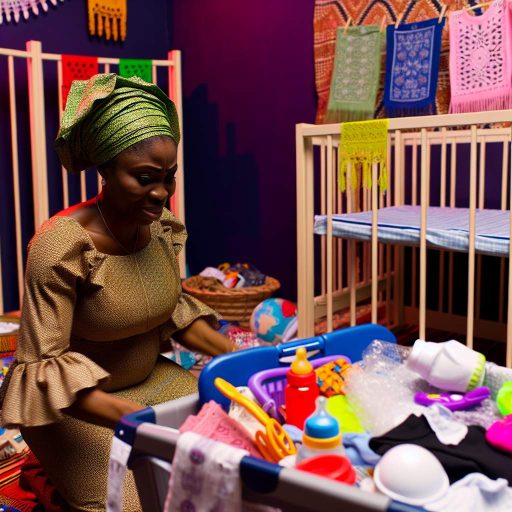Introduction
Debunking pregnancy myths that abound in Nigerian culture is essential, as they often influence expectant mothers’ choices.
These myths can shape behaviors, practices, and even healthcare decisions.
Many of these beliefs arise from long-standing traditions, which blend cultural significance and superstition.
Understanding the difference between traditional beliefs and modern medical advice is essential.
This knowledge empowers mothers to make informed choices about their health and the health of their babies.
By distinguishing facts from fiction, pregnant women can avoid unnecessary risks and complications.
The purpose of this blog is to debunk common pregnancy myths while presenting facts based on modern medical advice.
We aim to shed light on safe pregnancy practices and provide clarity on issues that may confuse expectant mothers.
As we explore these myths, we encourage readers to remember that cultural practices often stem from historical experiences.
However, advancements in medical science can offer better guidance for a healthy pregnancy.
For example, a common myth suggests that pregnant women should avoid bathing to prevent harm to the fetus.
Modern medical advice confirms that bathing is safe and helps maintain hygiene, reducing stress and discomfort.
Another myth claims that consuming certain foods determines a baby’s gender.
Scientific evidence disproves this notion, highlighting that a baby’s sex is determined at conception, not by maternal diet.
Many people believe that pregnant women shouldn’t exercise vigorously.
In reality, moderate exercise helps maintain physical fitness and can ease common pregnancy symptoms.
Through this blog, we will present various aspects of pregnancy care.
The goal is to promote well-being and healthy practices, rooted in accurate information.
Our commitment lies in guiding expectant mothers through these crucial months with factual insights.
By addressing these myths, we foster a better understanding of pregnancy and its associated challenges.
This understanding leads to healthier outcomes for both mothers and their babies.
Understanding Traditional Nigerian Pregnancy Myths
Nigerian culture is rich and diverse.
It is home to various ethnic groups, each with unique traditions and beliefs.
Among these customs are pregnancy myths.
These myths have significant cultural value, handed down through generations.
They often serve both practical and social functions within communities.
Understanding these myths is essential to appreciate their origins and implications.
This section explores the background of pregnancy myths in Nigeria, provides examples, and discusses their impact on expectant mothers.
Cultural Significance and Background of Myths
Pregnancy myths in Nigeria often stem from a blend of traditional beliefs and practices.
Many of these myths arise from observations of nature and human behavior.
They aim to provide guidance and support to expectant families.
This guidance transcends the medical realm, intertwining with spirituality and community values.
In many ways, these myths act as a social framework.
They reflect the hopes and fears surrounding pregnancy and childbirth within the community.
Moreover, these myths reinforce cultural identity.
They instill a sense of belonging and continuity among generations.
Pregnant women often rely on these beliefs, seeking reassurance in uncertain times.
As a result, myths become a coping mechanism, helping women navigate their pregnancy journeys.
However, not all myths are beneficial; some may contribute to fear and misinformation.
Examples of Common Pregnancy Myths
Several prevalent pregnancy myths circulate in Nigerian culture.
Below are some examples:
- “Pregnant women shouldn’t bathe at night.” This myth suggests that bathing at night can harm the baby.
Fear of water spirits or negative energy is often cited as the cause of this belief. - “Eating certain foods will lead to a fair-skinned baby.” Many pregnant women believe that consuming specific foods can influence their baby’s skin tone.
For example, eating a lot of yams and palm oil is thought to ensure a lighter complexion. - “Pregnant women should avoid certain fruits.” Some traditions dictate avoiding fruits like pineapples and papayas, believed to induce miscarriage.
- “A pregnant woman should not attend funerals.” This belief stems from concerns about bad luck affecting the unborn child.
Attending a funeral is seen as potentially inviting misfortune. - “Pregnancy cravings indicate the baby’s future traits.” Many believe that cravings can foreshadow the baby’s personality traits, leading to significant importance placed on them.
- “Curves on the pregnant woman’s shape predict the baby’s gender.” Some people believe that the shape and size of a woman’s belly can indicate whether she carries a boy or a girl.
Impact of These Myths on Expectant Mothers
The impact of these myths on pregnant women can be profound.
Some beliefs promote caution and care, leading to healthy choices.
For instance, avoiding harmful substances can safeguard both mother and baby.
However, many myths perpetuate fear and anxiety.
Pregnant women may feel pressured to follow strict guidelines that have no medical basis.
For instance, the belief that pregnant women must avoid bathing at night can create hygiene concerns.
This myth often leads to discomfort and stress.
The fear of adverse effects causes many women to neglect their basic health needs.
Parenting Made Just for You
Get personalized Parenting Solutions tailored to your child’s needs. Transform your parenting journey with expert guidance in 1-3 days.
Get StartedAdditionally, the idea that certain foods can affect a baby’s skin tone can foster unhealthy eating habits.
Women may obsessively monitor their diets based on these beliefs.
This fixation can lead to nutritional imbalances, impacting both mother and child.
Moreover, myths surrounding baby gender predictions can create undue pressure on mothers.
Society often places heavy expectations on the gender of the newborn.
Women may face disappointment or judgment, impacting their emotional and mental well-being.
Furthermore, myths about attending funerals or social events can isolate expectant mothers.
Cultural expectations may prevent them from engaging with their support networks.
Isolation can lead to feelings of loneliness and anxiety, affecting overall health.
Ultimately, these myths influence decision-making for expectant mothers.
Many women find themselves torn between adhering to traditions and seeking modern medical advice.
This internal conflict can create stress and confusion during a vulnerable time.
Bridging Traditional Beliefs with Medical Advice
Many women in Nigeria are increasingly turning to modern medical advice.
This shift allows them to make informed decisions about pregnancy.
However, the intersection of traditional myths and modern medicine can be complex.
Healthcare professionals must approach this relationship with sensitivity.
Education plays a crucial role in dispelling harmful myths.
By providing accurate information, healthcare providers can empower expectant mothers.
Encouraging dialogues about these myths can promote understanding and acceptance.
Furthermore, integrating beneficial traditional practices into modern care can create a balanced approach.
For example, community health programs can include culturally relevant discussions.
They can respect traditions while providing evidence-based guidance.
Ultimately, breaking the cycle of misinformation requires collaboration.
By working alongside traditional practitioners and cultural leaders, healthcare providers can foster a healthier environment for expectant mothers.
This collaborative approach reinforces the importance of comprehensive maternal care.
The Role of Culture in Shaping Pregnancy Beliefs
Influence of Cultural Practices and Community Beliefs on Pregnancy
Cultural practices and community beliefs significantly shape how people perceive pregnancy.
In Nigeria, various traditions influence prenatal care.
Families often rely on stories passed down through generations.
These stories often include dos and don’ts for pregnant women.
Cultural beliefs affect the health decisions of expectant mothers.
Women follow specific rituals to ensure a healthy pregnancy.
Many believe that certain foods can influence the baby’s gender.
In some cases, traditional healers play a key role in prenatal care.
These healers provide herbs or spiritual guidance, viewed as essential for a successful pregnancy.
Pregnancy myths often reflect broader community values.
For instance, some communities associate pregnancy with physical strength.
In these cultures, women are encouraged to avoid strenuous work during pregnancy.
Others emphasize rest and eating well to ensure successful childbirth.
These beliefs prioritize the well-being of both mother and child.
Distinct Traditions and Myths Among Nigerian Ethnic Groups
Nigeria is home to over 250 ethnic groups, each with unique pregnancy traditions.
Here are a few examples:
- Yoruba: Yoruba traditions encourage pregnant women to avoid “bad” sights and noises.
They believe these can negatively affect the unborn child. - Igbo: In Igbo culture, expectant mothers participate in special rituals.
These rituals are meant to invoke blessings from ancestors. - Hausa: Hausa customs focus on preparing pregnant women for childbirth.
They emphasize herbal medicine and dietary restrictions. - Efik: The Efik people believe in performing rites to appease the spirits.
They maintain that such acts can ensure a smooth delivery.
These traditions often contain elements of wisdom based on local knowledge.
They may include advice regarding nutrition and mental health.
However, some myths lack scientific backing and can be harmful.
For example, some believe that eating certain foods can cause a baby to be “darker” or “lighter.”
While genetics determine a child’s complexion, these myths still persist.
When discussing pregnancy, it is vital to understand these cultural narratives.
Unveil the Perfect Name that Tells Your Family's Story
Let us help you find a name that embodies your family's values, traditions, and dreams. Our personalized consultation weaves cultural insights to create a name that's uniquely yours.
Get StartedImportance of Respecting Cultural Beliefs While Promoting Evidence-Based Practices
Promoting evidence-based practices in prenatal care is essential.
However, ignoring cultural beliefs can alienate expectant mothers.
Finding a balance between traditional practices and modern medical advice is crucial.
Health care professionals should approach cultural beliefs with sensitivity.
They can begin by educating communities about prenatal health.
Here are ways to effectively integrate cultural and medical practices:
- Community Engagement: Involve community leaders in health education programs.
Leaders can help bridge gaps between modern medicine and traditional beliefs. - Inclusive Education: Use culturally relevant materials in health promotion campaigns.
This approach makes the information relatable and accessible. - Respectful Dialogue: Create safe spaces for discussing traditional beliefs.
Encourage open conversations about the benefits of modern medical practices. - Collaboration with Traditional Healers: Work with traditional healers to combine knowledge.
This collaboration can enhance trust between communities and health providers.
By encouraging dialogue, communities can make informed choices.
Respecting beliefs while delivering accurate information empowers mothers.
It enhances their ability to prioritize their health and that of their baby.
The role of culture in shaping pregnancy beliefs is undeniable.
While many traditions hold value, some must be critically examined.
Pregnant women deserve guidance grounded in scientific evidence.
This guidance helps navigate the complexities of pregnancy and childbirth effectively.
As Nigerians embrace modern medical advice, tradition also plays a role.
Cultural practices can coexist with evidence-based methods.
Pregnant women should feel supported by both their communities and modern healthcare.
By fostering understanding and respect, society can make informed decisions about pregnancy.
The well-being of future generations depends on blending these approaches in harmony.
Read: How to Stay Healthy and Active During Pregnancy: Tips for Nigerian Moms
Modern Medical Advice: What Science Says
Modern medical advice plays a crucial role in ensuring a healthy pregnancy.
It is grounded in evidence-based practices that prioritize the health of both mother and child.
Understanding these practices helps to dispel myths associated with pregnancy.
Let’s explore key aspects of prenatal care and how modern medicine addresses common misconceptions.
Overview of Evidence-Based Practices in Prenatal Care
Evidence-based prenatal care focuses on scientifically validated guidelines.
It aims to provide the best outcomes for mothers and their babies.
Here are some essential practices:
- Regular Check-Ups: Routine visits to a healthcare provider monitor the pregnancy’s progress.
- Ultrasound Scans: Imaging tests assess fetal development and identify potential issues.
- Blood Tests: These tests detect blood type, anemia, and infections that could harm the baby.
- Gestational Diabetes Screening: Testing for diabetes helps manage a mother’s blood sugar levels effectively.
- Vaccinations: Vaccinations protect both the mother and baby from certain diseases during pregnancy.
Each of these practices ensures that potential complications are identified early.
They also facilitate informed decision-making for expectant mothers.
Addressing Common Pregnancy Myths
Modern medicine actively debunks numerous pregnancy myths passed down through generations.
Here are some prevalent misconceptions and the scientific facts that counter them:
Hygiene Practices
Many cultures believe that pregnant women should avoid bathing frequently.
This myth stemmed from fears surrounding hygiene and the potential for illness.
- Fact: Regular bathing, as per modern medical advice, is encouraged.
- Fact: Maintaining hygiene prevents infections and promotes comfort during pregnancy.
- Fact: Showering helps mitigate the discomfort caused by physical changes in the body.
Additionally, there are myths related to skincare.
Some believe that skincare products may harm the baby.
However, research shows that most over-the-counter skincare products are safe.
Always consult with a healthcare provider before using any new products.
Diet
Dietary myths often misguide pregnant women.
One common myth suggests that certain foods should be completely avoided, including dairy products.
Here’s the truth:
- Fact: Dairy is an essential source of calcium, which supports fetal development.
- Fact: Pregnant women can consume dairy as long as it’s pasteurized.
- Fact: A balanced diet includes fruits, vegetables, proteins, and whole grains.
Moreover, some believe that eating for two means overindulging.
However, nutritionists emphasize moderation and quality over quantity.
Exercise
Physical activity during pregnancy is often met with hesitation.
Many believe exercise could harm the baby.
Modern medical advice contradicts this:
- Fact: Regular, moderate exercise benefits both physical and mental health.
- Fact: Activities like walking, swimming, or prenatal yoga are generally safe.
- Fact: Exercise helps alleviate common pregnancy discomforts, such as back pain.
It’s crucial to avoid high-impact activities that could lead to injury.
Pregnant women should always consult their healthcare provider before starting any exercise routine.
The Role of Healthcare Professionals
Healthcare professionals play a significant role in guiding pregnant women through their journey.
They provide reliable information and address concerns.
Here’s how they contribute:
- Education: Professionals educate women about what to expect during pregnancy.
- Guidance: They offer guidance on nutrition, exercise, and medication management.
- Support: Emotional and psychological support is vital for a healthy pregnancy experience.
- Monitoring: Regular monitoring ensures timely intervention if complications arise.
- Provided Resources: Healthcare providers can connect women with community resources and prenatal classes.
The ongoing dialogue between healthcare providers and pregnant women fosters trust.
This relationship enhances compliance with prenatal care recommendations.
Modern medical advice empowers women with reliable information.
It successfully dispels myths surrounding pregnancy.
Understanding evidence-based practices helps optimize prenatal care.
By prioritizing regular check-ups, maintaining hygiene, following a balanced diet, and engaging in safe exercises, women can ensure healthier pregnancies.
Additionally, support from healthcare professionals is crucial.
They provide the knowledge and reassurance needed during this transformative period.
As society continues to evolve, integrating traditional beliefs with modern medical practices will enhance maternal health.
Empowering women through education is essential.
As such, dispelling myths can pave the way for healthier generations.
Read: Key Pregnancy Tips for Nigerian Women: From Conception to Delivery

Comparing Myths vs. Medical Advice
Myth 1: Birth Positions
Many Nigerian traditions promote specific birth positions.
Some believe that squatting is the best way to give birth.
This position is thought to promote easier labor.
However, medical advice contradicts this idea.
Healthcare providers recommend various positions depending on comfort and safety.
Studies show that women should choose birth positions that feel best for them.
While squatting may work for some, lying on one’s side can enhance fetal circulation.
Each woman’s body responds differently during labor.
Some common positions include:
- Upright (sitting or standing)
- Side-lying
- All-fours
- Sitting on a birth ball
Ultimately, the best choice enhances comfort and safety during delivery.
Myth 2: Dietary Restrictions During Pregnancy
Nigerian traditions often advise strict dietary restrictions during pregnancy.
Many believe that certain foods may lead to complications.
For example, some women avoid all forms of meat.
Others fear that consuming too much fruit will harm the baby.
Medical advice, however, supports a well-balanced diet.
Expectant mothers need a variety of nutrients.
This includes proteins, vitamins, and minerals.
Healthcare professionals recommend including lean meats, eggs, fruits, and vegetables.
Essential nutrients for pregnancy include:
- Folic acid (crucial for fetal development)
- Iron (to prevent anemia)
- Calcium (for bone health)
- Omega-3 fatty acids (crucial for brain development)
Expectant mothers should consult healthcare providers for personalized dietary advice.
Myth 3: Ultrasound Safety Concerns
Ultrasound procedures face skepticism in some Nigerian communities.
Some believe they may harm the developing fetus.
Others worry about the exposure to sound waves.
They fear that frequent scans cause potential risks.
Contrary to these myths, medical research supports ultrasound safety.
Medical professionals emphasize that ultrasound uses sound waves, not radiation.
This technology has proven safe for both mother and baby.
Healthcare providers typically recommend a limited number of scans, often as follows:
- First trimester: Confirmation of pregnancy and assessment of fetal development
- Second trimester: Anomaly scan to detect congenital disabilities
- Third trimester: Monitoring fetal growth and position
Ultrasounds are crucial for monitoring a healthy pregnancy.
Myth 4: Traditional Remedies for Morning Sickness
Many Nigerian cultures employ traditional remedies to relieve morning sickness.
Some rely on herbal concoctions or specific foods.
For example, ginger and certain local herbs are commonly recommended.
While some traditional remedies may offer comfort, medical advice often suggests other approaches.
Healthcare providers endorse a variety of strategies to alleviate nausea.
They may suggest consuming small, frequent meals and staying hydrated.
Proven methods to counter morning sickness include:
- Ginger tea or ginger supplements
- Crackers before getting out of bed
- Lemon or peppermint tea
- Avoiding strong odors that trigger nausea
Women experiencing severe nausea should consult medical professionals for further guidance.
Myth 5: Pregnant Women Should Not Exercise
Some Nigerian traditions discourage exercise during pregnancy.
Many believe it can lead to miscarriage or early labor.
These fears result in many women becoming inactive during pregnancy.
However, medical advice supports appropriate exercise.
Regular physical activity can improve overall health during pregnancy.
Healthcare providers recommend activities such as walking, swimming, and prenatal yoga.
Benefits of exercising during pregnancy include:
- Reduced risk of gestational diabetes
- Improved mood and decreased anxiety
- Better sleep quality
- Increased strength and stamina for labor
Women should discuss exercise routines with their healthcare provider to ensure safety.
Myth 6: Limited Prenatal Care Visits
Many Nigerian traditions suggest fewer prenatal visits.
Some women believe minimal check-ups save time and money.
They often think this practice is beneficial to the mother and baby.
Medical advice strongly advocates for regular prenatal care.
Routine visits allow healthcare providers to monitor both mother and baby.
They can identify potential issues early and provide necessary interventions.
Typical prenatal visit schedules include:
- Monthly visits during the first six months
- Bi-weekly visits during the seventh and eighth months
- Weekly visits in the final month
Consistent prenatal care significantly increases the chances of a healthy pregnancy.
Myth 7: Pregnancy Should Be Kept a Secret
In many cultures, including Nigeria, some women feel pressured to hide their pregnancies.
Family and community beliefs often discourage sharing this news early.
Some think that revealing a pregnancy can lead to bad luck or complications.
However, medical advice recommends sharing pregnancy news and seeking support.
This openness can enhance emotional well-being.
Additionally, having a support network can be crucial during pregnancy.
Communicating about pregnancy helps in several ways:
- Access to emotional support
- Sharing experiences and advice
- Encouragement from family and friends
A supportive environment helps women navigate the challenges of pregnancy.
Understanding the differences between Nigerian traditions and modern medical advice is crucial for expectant mothers.
Women should evaluate the origins of certain beliefs.
By embracing science-backed practices, they can ensure healthier pregnancies.
Ultimately, pregnant women benefit from seeking guidance from healthcare professionals.
This approach fosters better health outcomes and empowers expectant mothers.
Read: Essential Pregnancy Tips for Expecting Mothers in Nigeria
Potential Risks of Adhering to Myths
Pregnancy is a transformative period in a woman’s life.
It involves physical changes, emotional fluctuation, and a host of societal expectations.
In Nigeria, traditional beliefs significantly influence how women approach pregnancy.
Sadly, many of these traditions turn into myths that can harm both mother and baby.
Some prevalent myths suggest that certain behaviors can ensure an easy pregnancy or a healthy child.
However, adhering to these myths can lead to serious consequences.
Below, we analyze the potential risks associated with some common pregnancy myths.
Skipping Prenatal Care
Many traditional beliefs suggest that regular prenatal care is unnecessary.
Some people think that if a woman feels good, she does not need to see a doctor.
This belief can be hazardous.
Skipping prenatal check-ups can lead to the following:
- Undiagnosed health conditions: Conditions like gestational diabetes or hypertension can develop unnoticed.
- Delayed interventions: Critical complications may arise that would require immediate medical attention.
- Unmonitored fetal development: Doctors can spot problems that the mother might overlook.
For instance, a case study involving a Nigerian woman revealed that she avoided prenatal visits.
She later discovered she had high blood pressure.
This condition caused her to experience complications during labor, leading to an emergency C-section.
Believing in Dietary Myths
Several dietary myths circulate during pregnancy.
Some believe that women should avoid fruits, believing they cause excessive weight gain.
Others claim that certain foods can guarantee the sex of the baby.
Such myths can trigger poor nutrition, resulting in:
- Malnutrition: Women may miss essential nutrients necessary for fetal growth.
- Complications: Poor dietary choices can lead to anemia or gestational diabetes.
- Low birth weight: Insufficient nutrition can result in underweight babies.
A testimonial from a Nigerian mother illustrates this issue.
She strictly avoided fruits based on traditional beliefs.
Consequently, her baby was born with low birth weight and required special care after delivery.
Ignoring Mental Health
Another pervasive myth suggests that emotional well-being is irrelevant during pregnancy.
Many women feel pressured to present a calm exterior.
They might ignore feelings of anxiety or depression.
Ignoring mental health can lead to:
- Increased stress: Chronic stress can affect both the mother and baby adversely.
- Postpartum depression: Women who neglect their mental health may experience severe postpartum issues.
- Poor bonding: Stress can impair the emotional connection between mother and child.
An example of this involves a Nigerian woman, who felt isolated during her pregnancy.
She adhered to the myth of silent suffering, ultimately facing severe anxiety during childbirth.
Relying on Traditional Remedies
Many cultures deeply value traditional pregnancy remedies.
In Nigeria, some individuals recommend herbal concoctions for morning sickness.
While some may provide relief, others can be dangerous.
Risks include:
- Unregulated substances: Many herbs lack scientific testing and can cause side effects.
- Interactions with medications: Some herbs may interfere with prescribed medications.
- Misleading assurances: Relying on traditional remedies can give a false sense of security.
A Nigerian mother reported using a herbal preparation for nausea.
She later discovered it contained a harmful ingredient.
This revelation made her aware of the importance of consulting healthcare professionals.
Enduring Pain without Assistance
Some myths advocate that pregnant women should endure pain without help.
Such myths encourage a woman’s strength but can have dangerous results.
Risks associated with this belief include:
- Increased suffering: Labor pain can be managed with medical help, but some women resist.
- Emergency complications: Ignoring severe pain during labor may lead to complications.
- Negative birth experience: Women may suffer trauma if they feel unsupported during labor.
A case study illustrates this risk.
A Nigerian woman endured severe pain during childbirth, believing it was a mark of strength.
She later faced significant emotional distress from the experience.
Importance of Informed Decisions
As we explore these myths, it becomes evident that informed decision-making is essential.
It helps empower pregnant women to make choices that promote their health and their baby’s well-being.
Here are some key points to consider:
- Consult healthcare professionals: Routine check-ups help monitor maternal health.
- Focus on proper nutrition: Balanced diets can foster healthy growth and development.
- Seek support for mental health: Understanding the importance of emotional health is vital.
- Ask questions about traditional remedies: Discuss the safety of such approaches with healthcare providers.
- Educate oneself about labor options: Explore pain management and support systems available.
In fact, adhering to traditional myths can harm both mothers and babies.
Education and awareness about contemporary medical advice are crucial.
Making informed choices can facilitate a safe pregnancy journey, ensuring better outcomes for mothers and their little ones.
Read: Essential Baby Prep List for Nigerian Moms-to-Be
Bridging the Gap: Blending Tradition with Modernity
Strategies for Integrating Traditional Practices with Modern Medical Advice
Bridging the gap between Nigerian traditions and modern medical advice requires thoughtful strategies.
These strategies can help pregnant women receive comprehensive care that respects their culture and promotes their health.
Here are some effective strategies:
- Encourage Open Dialogue: Foster conversations between healthcare providers and patients.
Listen to concerns and beliefs regarding pregnancy. - Offer Educational Workshops: Organize community workshops about prenatal care.
Provide valuable information about modern healthcare practices. - Utilize Peer Educators: Train respected community members as health advocates.
They can share knowledge and promote healthy behaviors in culturally sensitive ways. - Incorporate Traditional Practices: Identify safe traditional practices that align with medical advice.
Encourage their use in conjunction with modern methods. - Develop Informational Materials: Create brochures and pamphlets that combine traditional wisdom with scientific facts.
Use relatable language and visuals for better understanding. - Leverage Social Media: Use various platforms to reach wider audiences.
Share success stories that blend tradition and modern care. - Build Support Groups: Establish support networks for pregnant women.
Involve mentors who can guide them through both traditional and medical practices.
Collaboration Between Community Leaders and Healthcare Professionals
Collaboration between community leaders and healthcare professionals is vital for educating pregnant women.
This partnership can enhance the effectiveness of healthcare delivery while respecting cultural practices.
Here are some ways they can work together:
- Form Joint Committees: Create committees comprising healthcare workers and community leaders.
They can assess local needs and devise shared solutions. - Host Community Health Fairs: Organize health fairs that include both traditional healers and medical practitioners.
This helps to demystify health education. - Engage Traditional Birth Attendants: Train and integrate traditional birth attendants (TBAs) into the healthcare system.
Provide them with vital information to support safer deliveries. - Conduct Joint Outreach Programs: Utilize the influence of community leaders for outreach.
They can mobilize community members to participate in health initiatives. - Develop Culturally Relevant Materials: Work together to produce educational materials that resonate with the community’s beliefs.
Consider visuals and examples that are culturally meaningful. - Encourage Community Feedback: Actively seek feedback from women in the community.
Use their insights to improve healthcare strategies and address misconceptions.
The Importance of Culturally Sensitive Healthcare Practices
Culturally sensitive healthcare practices are crucial for effective treatment.
They ensure that healthcare providers respect traditions and beliefs.
Here are key reasons to prioritize cultural sensitivity:
- Enhances Trust: When healthcare providers acknowledge cultural beliefs, it builds trust.
Patients feel more comfortable discussing their health issues openly. - Improves Patient Compliance: Women are more likely to follow health advice that aligns with their cultural practices.
This leads to better health outcomes. - Reduces Misunderstandings: Culturally sensitive practices help avoid miscommunication.
This ensures that patients understand medical advice better. - Promotes Inclusivity: Integrating cultural insights promotes inclusiveness in healthcare.
It encourages a holistic view of the patient’s well-being. - Supports Mental Wellness: Respecting cultural beliefs can reduce anxiety.
Pregnant women benefit from knowing their traditions are valued in their care. - Encourages Community Participation: Culturally sensitive practices invite community involvement.
This strengthens the overall healthcare system.
To create better connections between traditional practices and modern medicine, we must embrace collaborative efforts.
Healthcare professionals should strive to understand the rich cultural heritage of Nigerian traditions.
By fostering open dialogue and implementing inclusive strategies, we can enhance healthcare experiences for pregnant women.
The results will yield healthier mothers and children.
Ultimately, bridging the gap between tradition and modernity is about finding common ground.
It’s about integrating life-saving medical advice with culturally significant practices.
This ensures that all women receive the best possible care during pregnancy.
Nigerian society has a rich cultural heritage surrounding pregnancy, making it essential to understand these traditions for effective healthcare.
Valuing and integrating these approaches allows us to provide pregnant women with the support they deserve.
In short, the journey toward culturally sensitive healthcare is ongoing.
By blending traditional practices with modern medicine, we can enrich the lives of many women and honor the legacy of their lineage.
Conclusion
Debunking pregnancy myths is crucial for healthier outcomes for mothers and babies.
Many traditional beliefs may not align with modern medical advice.
Misunderstandings can lead to unnecessary risks during pregnancy.
By addressing these myths, we empower expectant families with knowledge.
Accurate information improves maternal and fetal health significantly.
Pregnant women deserve the best guidance available.
Expectant mothers must seek medical advice when facing pregnancy-related concerns.
Engaging with healthcare professionals fosters informed decisions.
Women should challenge longstanding misconceptions about pregnancy.
Doing so encourages a more scientific approach to prenatal care.
Evidence-based practices safeguard the health of both mother and child.
It is essential to prioritize factual information during this critical period.
Ongoing dialogue between traditional beliefs and modern medicine is vital.
Integrating cultural practices within medical frameworks can enhance understanding.
Collaborative efforts can lead to safer pregnancy practices across Nigeria.
Healthcare providers must respect cultural contexts while promoting evidence-based care.
Mutual respect fosters trust and encourages more women to seek medical help.
Sharing experiences among communities can further demystify pregnancy.
Expectant mothers can learn from each other and professionals.
Open conversations reduce stigma around discussing health concerns.
By creating supportive networks, we empower women during their pregnancy journey.
Ultimately, the goal is to ensure healthy pregnancies across Nigeria.
Ample support will help mothers make informed choices.
Efforts to bridge gaps between traditions and modern practices will pay off.
Every woman deserves accurate information for a successful pregnancy.
Let’s work collectively to dispel myths and encourage healthy practices.




